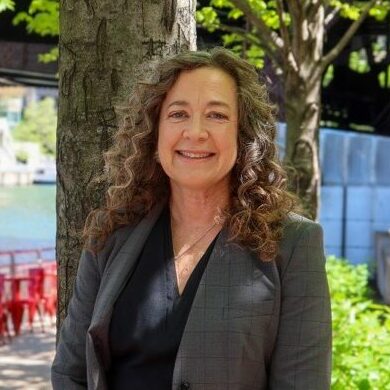September 10, 2025
ELPC Challenges EPA’s Methane Rule Delay
Cutting methane pollution is one of the fastest, most effective ways to slow climate change. The EPA’s interim final rule allows more methane and hazardous emissions to harm the health and quality of life of Midwest communities.
By Wendy Bloom, Senior Attorney & Max Lopez, Associate Attorney
At a recent public hearing, two ELPC attorneys and two ELPC members delivered testimony opposing EPA’s interim final rule that delays compliance deadlines of the 2024 methane standards for the oil and gas industry. This misguided rollback would weaken critical protections against methane and other toxic pollutants emitted by oil and gas operations, many of which operate in the Midwest.
Two ELPC attorneys spoke on separate but complementary topics: the health and climate harms of the interim final rule, and the legal errors in EPA’s approach.
Wendy Bloom, ELPC Senior Attorney: Health & Climate Impacts
Wendy focused on the real-world harms of delaying the 2024 Methane Rule deadlines:
- Public health risk: By EPA’s own Regulatory Impact Analysis, enforcing the 2024 deadlines would reduce asthma rates, ER visits for respiratory conditions, and premature deaths in the Midwest by cutting ozone-forming pollution. Delays will postpone these critical protections.
- Climate harms intensify: EPA acknowledged that enforcing the 2024 Rule on time would prevent 130 million metric tons of methane emissions between 2024–2029. Methane is a potent greenhouse gas, and delaying action accelerates climate damage.
- Great Lakes at stake: ELPC’s recent 2025 Climate Assessment Update shows worsening impacts including warmer waters, harmful algal blooms, declining fisheries, and more extreme weather. These risks will worsen without strong methane safeguards.
“EPA’s Interim Final Rule threatens the public health of Midwesterners and our environment because the Rule will postpone much needed reductions in air pollutants. We urge EPA to support healthy air and to stand with the public by withdrawing the Interim Final Rule.”
Max Lopez, ELPC Associate Attorney: Legal Errors
Max explained why EPA’s interim final rule is unlawful under the Clean Air Act and the Administrative Procedure Act (APA):
- Notice-and-comment requirements ignored: The Clean Air Act requires EPA to solicit and respond to public comment before revising rules like the 2024 Methane Rule. EPA skipped this process, citing a narrow and inapplicable “good cause” exception.
- “Good cause” doesn’t apply: Courts have consistently rejected EPA’s attempts to delay pollution safeguards by claiming rule changes are “unnecessary” or “impracticable,” which is required for the “good cause” exception to apply. That is clearly not the case when it comes to delaying the 2024 Rule, which has major consequences for public health and the environment.
- Precedent is clear: Courts have struck down similar delay rules before, including when EPA argued it needed to avoid industry compliance costs. Protecting industry’s “bottom line” is not a legal basis for bypassing public process.
“It is clear that EPA has not shown that the narrow and stringent circumstances of the good cause exception apply in this instance. Therefore, this rule has been issued in violation of the notice and comment requirements of the APA and CAA.”
Midwest Voices Speak Out
In addition to ELPC staff testimony, two ELPC members shared their personal stories on why strong methane protections matter to their personal health, property, and quality of life.
- Paula Leach, Antrim County, Michigan
- “I recently became aware of the significant presence of oil and gas wells near my property, which makes me more worried than ever about the air pollution they produce… Our family enjoys the outdoors. During the summer, we swim, bike, kayak, and boat in the Torch Lake watershed, and we cherish the pristine environment that makes these activities so special. I do not want to see it devalued due to toxic methane emissions from the oil and gas industry.”
- Elizabeth Del Buono, Grand Traverse County, Michigan
- “In Grand Traverse County, where I live, there are 1,747 active wells… as a retired physician who practiced for approximately 30 years, I am well aware of the impact that such pollutants have on our bodies. For example, volatile organic compounds and smog worsen asthma and respiratory disease, cause nervous system and developmental harm, and cause cancer. Children are especially vulnerable.”
Why It Matters
Methane is over 80 times more potent than carbon dioxide over a 20-year timeframe. Cutting methane pollution is one of the fastest, most effective ways to slow climate change while delivering significant public health benefits.
On a local level, the EPA’s interim final rule allows more methane and hazardous emissions to harm the health and quality of life of Midwest communities — especially in Michigan and North Dakota, regions home to many oil and natural gas facilities.
The compliance deadlines in the 2024 Methane Rule were based on years of input from the public, states, and industry. By unilaterally delaying them, EPA undermines its own science, its legal obligations, and its mission to protect public health and the environment.
ELPC will continue to fight EPA’s unlawful rollback and push for strong methane safeguards that protect Midwestern communities, the Great Lakes, and our climate.


